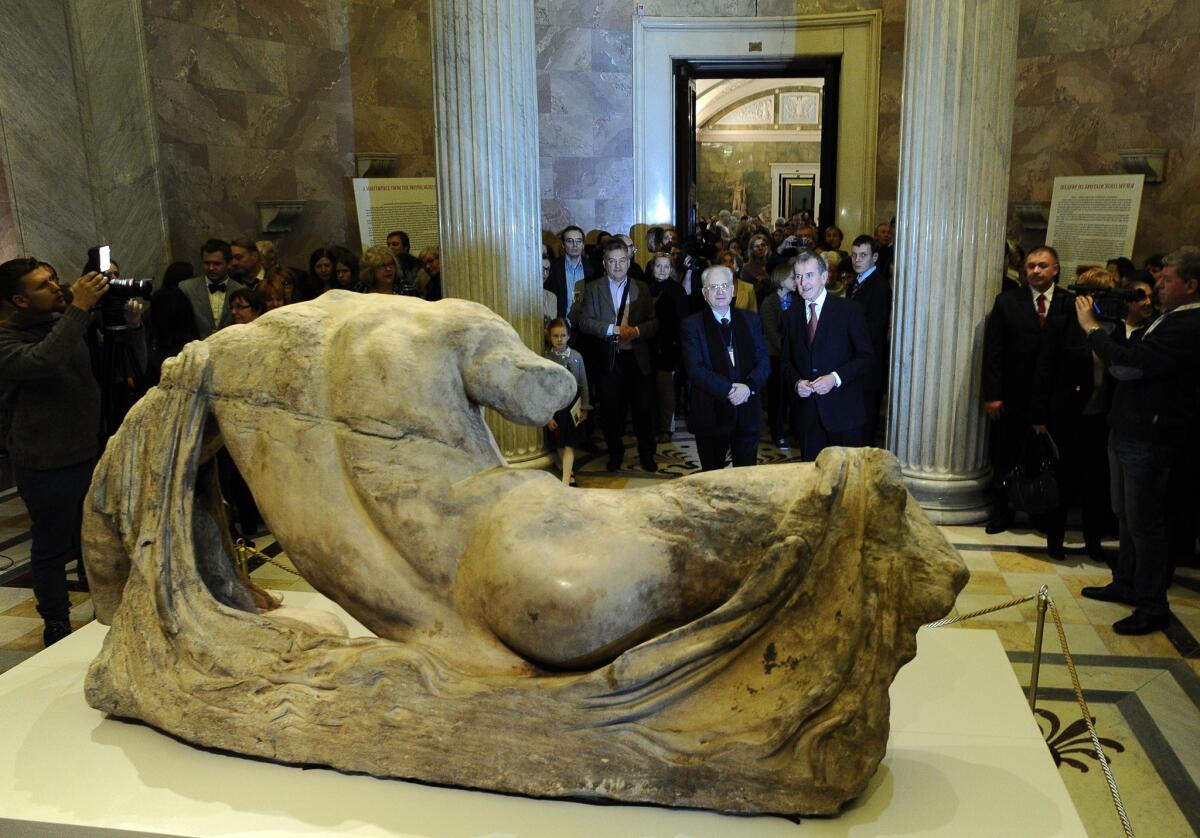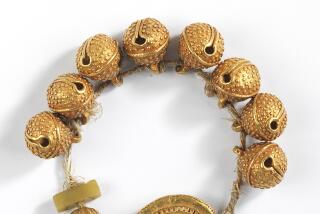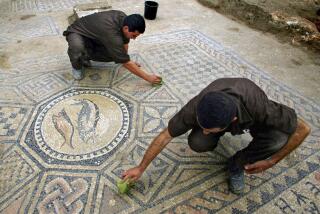Greece outraged by British loan of Elgin Marbles piece to Russia

- Share via
The Elgin Marbles, which once adorned the Parthenon in Athens and belong to a category of rare art treasures capable of causing an international incident, have done precisely that.
The British Museum — a government institution — has sent one of the Parthenon statues it has owned since 1816 to Russia for display starting Saturday at the State Hermitage Museum in St. Petersburg.
The move has infuriated the government of Greece, which has long insisted that the sculptures were looted and should be sent home. The Greek prime minister is calling it “an affront to the Greek people.”
The headless, reclining statue, depicting the Greek river god Ilissos, joins an exhibition celebrating the Hermitage’s 250th anniversary and will be on display there until Jan. 18.
It is the first time one of the Parthenon sculptures has left the British Museum since it acquired them after Lord Elgin, a British aristocrat, had removed them from the ancient temple starting in 1801, with the permission of Turkish authorities who then ruled Greece.
The British Museum says that its Parthenon holdings account for “about a third of the original decoration of the temple.”
Greek Prime Minister Antonis Samaras, a former minister of culture, said in a written statement Friday that “the decision by the British Museum to give out on loan one of the Parthenon sculptures ... is an affront to the Greek people …. We Greeks are one with our history and civilization, which cannot be broken up or loaned out.”
He added that the art loan invalidates past arguments by the British Museum that the marbles can’t be moved.
Greece’s push for the sculptures’ return has been gathering significant international support, including from the United Nations Economic, Social and Cultural Organization (UNESCO). Its Intergovernmental Committee for Promoting the Return of Cultural Property to its Countries of Origin resolved in October to press the British government to enter formal discussions, mediated by UNESCO, for the return of the Elgin Marbles to Greece.
The British Museum’s director, Neil MacGregor, wrote in his blog on the museum’s website that “when our colleagues at the Hermitage asked if we might also make an important loan to celebrate their 250th anniversary, the Trustees immediately answered yes. And no loan could more fittingly mark the long friendship of our two houses, or the period of their founding, than a sculpture from the Parthenon.”
The Telegraph newspaper in Britain reported that MacGregor, in an interview with BBC Radio, said that the British Museum also would entertain a loan request from Greece:
“The Greek government has always refused to borrow, to date, but the [British Museum] trustees’ position is very clear that they will consider any request from anyone who is prepared to return the object.”
The loan to the Hermitage comes at a time of extreme tension between Russia and the NATO nations, including the United States and Great Britain, over Russia’s seizure of the Crimea from Ukraine and its support for militants fighting for autonomy in eastern Ukraine.
A spokesman for British Prime Minister David Cameron told the Telegraph that “we recognize that this will be a really interesting exhibition for the people of Russia,” and that the loan reflects “the trust between the two museums and the kind of working relationship between the two of them.”
There’s currently no such trust or relationship between Russian state museums and American museums: Since 2010, Russia has refused to send objects from its state collections to the U.S., saying it fears they would be seized to satisfy a monetary judgment against Russia issued by a U.S. federal court in a private dispute having nothing to do with American museums.
The Russian position is widely considered a pretext. Chabad, the Orthodox Jewish sect that won the judgment in a suit for the return of an important collection of its religious texts, has filed court papers affirming that it will not try to seize loaned Russian artworks as collateral for the debt.
The Los Angeles County Museum of Art felt the ban’s effects when the Hermitage reneged on a previous agreement to loan a gold-and-silk-embroidered Turkish tent that was to have been the centerpiece of the L.A. museum’s 2011 exhibition, “Gifts of the Sultans: the Art of Giving at the Islamic Courts.” The show went on without it and other works from Russia whose loans had been rescinded.
Christine Anagnos, executive director of the Assn. of Art Museum Directors, said Friday that there was no formal embargo going the other way, but that she knows of no art loans from American to Russian museums since the dispute erupted.
“We’re at a point where, unfortunately, I think things are going to stay the status quo,” Anagnos said.
Follow @boehmm of the L.A. Times for arts news and features
More to Read
The biggest entertainment stories
Get our big stories about Hollywood, film, television, music, arts, culture and more right in your inbox as soon as they publish.
You may occasionally receive promotional content from the Los Angeles Times.











